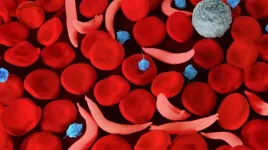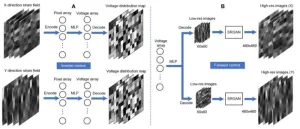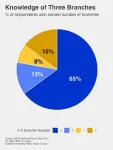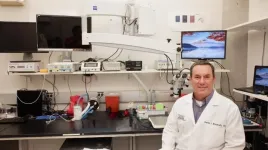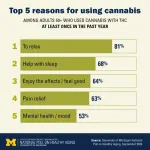(Press-News.org) National Institutes of Health (NIH) researchers and collaborators have found that being a carrier for sickle cell disease, known as having sickle cell trait, increases the risk of blood clots, a risk that is the same among diverse human populations that may not traditionally be associated with sickle cell disease. The study provides estimated clinical risks for people with sickle cell trait, which can inform clinical practice guidelines. Researchers examined the largest and most diverse set of people with sickle cell trait to date, which includes data from over 19,000 people of various ancestral backgrounds with sickle cell trait.
The study, published in Blood Advances, was led by researchers at National Human Genome Research Institute (NHGRI), part of NIH, The Johns Hopkins University School of Medicine, Baltimore, and the company 23andMe, South San Francisco, California.
Previous research investigating the relationship between sickle cell trait and blood clots have only included individuals of African genetic ancestry and self-identified Black participants because of the incorrect assumption that the genetic carrier state only affects those who identify as Black or African American. While sickle cell trait in the United States is most prevalent in individuals who self-identify as Black or African American, individuals from all ancestral backgrounds may have sickle cell trait. Sickle cell trait is often found in individuals living in or from West and Central Africa, Mediterranean Europe, India and the Middle East.
“Because sickle cell trait is often associated with people who identify as Black or African American, it is not widely studied in other populations, a bias that has led to unintended harm for those with sickle cell trait,” says Vence Bonham Jr., J.D., who co-led the study and serves as acting deputy director and associate investigator at NHGRI. “In particular, the racialization of sickle cell trait has resulted in biased estimations of health risks. The results of our study will help clinicians properly contextualize the risk of blood clots amongst people with sickle cell trait without unintended bias.”
Individuals in this study are part of the 23andMe research program and have volunteered to participate in the research online and provided informed consent, which includes allowing their de-identified data to be analyzed and subsequently shared with research collaborators. Using data from this research cohort, which consists of over four million participants, researchers calculated the risk of blood clots in the veins, also known as venous thromboembolism. Through statistical analyses, participants were grouped based on their genetic similarities into genetic ancestry groups. The study found that people with sickle cell trait have a 1.45-fold higher risk of venous thromboembolism than those without sickle cell trait, a risk that is similar across all studied genetic ancestry groups.
To help clinicians estimate the risk of blood clots in people with sickle cell trait in comparison to other genetic carrier states, the researchers analyzed risk in people who are carriers for Factor V Leiden, a well-known inherited blood-clotting disorder. The study found that carriers for Factor V Leiden, which is more prevalent in people of European genetic ancestries, had an even higher risk of venous thromboembolism than people with sickle cell trait.
The researchers found that people with sickle cell trait have a higher risk of a type of blood clot called pulmonary embolism than those without sickle cell trait. Pulmonary embolism occurs when a blood clot breaks loose from deep veins, travels through the blood stream, reaches the lungs and stops blood flow. While people who experience pulmonary embolism may not always have symptoms, they might experience shortness of breath, chest pain and fainting.
While previous studies have demonstrated that in individuals with sickle cell trait, the risk of blood clots occurring in the lungs is higher than the risk of clots occurring only in the legs, this study supports the link more definitively with a larger sample size.
“This study, therefore, provides important insights about patterns of venous blood clots and suggests a unique mechanism of blood clotting in people with sickle cell trait,” said Rakhi Naik, M.D., clinical director for the Division of Hematology at Johns Hopkins University, Baltimore, who co-led the study. “Knowing the risks of blood clots in people with sickle cell trait is important for situations such as surgeries or hospitalizations, which add to the risk of developing serious blood clots.”
Over 2 million people in the United States have sickle cell trait. People with sickle cell trait have one copy of the genomic variant that causes sickle cell disease, a genetic condition that causes red blood cells to become rigid and sticky, which blocks blood flow. While people with sickle cell trait typically do not have any associated health complications, they are carriers for sickle cell disease. In rare cases, sickle cell trait has been found to be a risk factor for health complications such as muscle breakdown, presence of blood in the urine and kidney disease
END
Genetic carriers for sickle cell disease have higher risks of blood clots across diverse ancestries
Study finds that sickle cell trait is prevalent among diverse human populations
2024-09-12
ELSE PRESS RELEASES FROM THIS DATE:
Study finds unique pattern of blood clots in sickle cell trait, but low overall clot risk
2024-09-12
(WASHINGTON – September 12, 2024) The risk of venous thromboembolism (VTE), or blood clots, in individuals with sickle cell trait (SCT) is higher than in individuals without the trait. However, the risk is lower than for those with heterozygous factor V Leiden (FVL), according to a study published today in Blood Advances that analyzed genetic data from 23andMe research participants.
More than 100 million people worldwide and approximately 7% of Black individuals in the United States have SCT. Unlike sickle cell disease, ...
Deep learning for strain field customization in bioreactor with dielectric elastomer actuator array
2024-09-12
A research paper by scientists at Purdue University presented a deep learning method that enables the customization of complex strain fields according to specific requirements.
The new research paper, published on Aug. 14 in the journal Cyborg and Bionic Systems, used a deep learning method based on image regression and achieved to predict and customize complex strain fields.
Traditional bioreactors, powered by pneumatic actuators or motors, struggle to generate complex strain fields due to limited control over individual actuators. However, fields like cardiovascular biomechanics and tissue engineering require more advanced customization. “In the field of biomechanics, customizing ...
Killer yeasts may help remedy a craft beer brewing bother
2024-09-12
Highlights:
Diastatic yeasts can spoil craft beer through hyperattenuation, which boosts the alcohol content and causes bottles to explode.
Killer toxins, which are produced by other yeast strains, hint at a remedy.
In a proof-of-concept study, researchers found that killer toxins inhibited up to 95% of diastatic yeasts.
More work is needed to fine tune the recipe, but killer yeasts may help brewers remedy potentially contaminated beers.
Washington, D.C. — Sept. 12, 2024 — When diastatic strains of Saccharomyces cerevisiae, ...
Nationwide awards recognize 21 students, schools and educators’ commitment to health
2024-09-12
DALLAS, September 12, 2024 — The American Heart Association, celebrating 100 years of lifesaving service in 2024, is recognizing 21 students, educators and elementary, middle and high schools from across the country who are making a bold impact in the battle against cardiovascular disease – the nation’s leading cause of death. These exceptional individuals and institutions were honored for their unwavering commitment to the Association’s in-school programs, Kids Heart Challenge™ ...
Bake, melt or ignite: How synthesis methods have a profound impact on disordered materials
2024-09-12
A new study has revealed for the first time how different synthesis methods can profoundly impact the structural and functional properties of high entropy oxides, a class of materials with applications in everyday electronic devices. The study was published this week in the Journal of the American Chemical Society.
“The specific material that we’ve studied here is a high entropy oxide with a spinel crystal structure, which is a mixture of five different transition metal oxides. A lot of the excitement that we ...
A majority of Americans can’t recall most First Amendment rights
2024-09-12
Less than half of Americans can name most of the rights protected under the First Amendment and under two-thirds can name the three branches of government, according to the Annenberg Constitution Day Civics Survey, released annually since 2014.
The Annenberg Public Policy Center’s nationally representative survey, conducted in May 2024 with about 1,600 U.S. adults, finds levels of public knowledge largely unchanged from 2023. As was true last year, most Americans could name only a single right guaranteed by the First Amendment: freedom of speech, provided by nearly 3 in 4 respondents.
The survey also found strong public support for ...
2024 Blavatnik National Awards for Young Scientists announced
2024-09-12
NEW YORK, September 12, 2024 – For the second time, the Blavatnik Family Foundation and The New York Academy of Sciences named three women scientists as Laureates of the Blavatnik National Awards for Young Scientists. Each will receive $250,000, the largest unrestricted scientific prize offered to America’s most promising, faculty-level scientific researchers under 42. Three independent juries – one each for life sciences, chemical sciences, and physical sciences & engineering – composed of some of America’s most distinguished scientists selected the three winning Laureates. An additional 15 Finalists will each receive ...
TTUHSC’s Jerry H. Hodge School of Pharmacy establishes Brain Drug Discovery Center
2024-09-12
After more than a decade of research growth and recruiting efforts to build strong, collaborative research programs, the Jerry H. Hodge School of Pharmacy in Amarillo has developed the Brain Drug Discovery Center, the newest Texas Tech University Health Sciences Center (TTUHSC) research center.
Created from two existing pharmacy school centers — the Center for Blood-Brain Barrier Research and the Cancer Biology Research Center — the Brain Drug Discovery Center will focus on ...
Collaborative three-campus QB3 research team awarded $12 million CIRM grant to study origins of autism in diverse population
2024-09-12
A QB3-led team uniting researchers from the University of California campuses at Berkeley, San Francisco, and Santa Cruz was awarded a $12 million grant from the California Institute for Regenerative Medicine (CIRM) to investigate the origins of autism using sophisticated cellular models called “neural organoids.”
This grant is the first funding brought in by QB3’s Collaborative Research initiative, which was recently created to address major challenges in human health by leveraging research talent and resources across the UC campuses served by QB3.
"We are grateful for the support provided by the CIRM team to craft a highly successful application ...
Cannabis and older adults: Poll shows current use patterns, beliefs and risks
2024-09-12
Whether they’re using it for recreational or medical reasons, a sizable percentage of people in their 50s and older have smoked, eaten, drunk or applied to their skin at least one form of cannabis in the past year, a new poll shows.
In all, 21% of people age 50 and older said they used a form of cannabis that contains the psychoactive compound THC at least once in the past year, according to new findings from the University of Michigan National Poll on Healthy Aging. The poll report focuses on use of cannabis ...
LAST 30 PRESS RELEASES:
Cal Poly’s fifth Climate Solutions Now conference to take place Feb. 23-27
Mask-wearing during COVID-19 linked to reduced air pollution–triggered heart attack risk in Japan
Achieving cross-coupling reactions of fatty amide reduction radicals via iridium-photorelay catalysis and other strategies
Shorter may be sweeter: Study finds 15-second health ads can curb junk food cravings
Family relationships identified in Stone Age graves on Gotland
Effectiveness of exercise to ease osteoarthritis symptoms likely minimal and transient
Cost of copper must rise double to meet basic copper needs
A gel for wounds that won’t heal
Iron, carbon, and the art of toxic cleanup
Organic soil amendments work together to help sandy soils hold water longer, study finds
Hidden carbon in mangrove soils may play a larger role in climate regulation than previously thought
Weight-loss wonder pills prompt scrutiny of key ingredient
Nonprofit leader Diane Dodge to receive 2026 Penn Nursing Renfield Foundation Award for Global Women’s Health
Maternal smoking during pregnancy may be linked to higher blood pressure in children, NIH study finds
New Lund model aims to shorten the path to life-saving cell and gene therapies
Researchers create ultra-stretchable, liquid-repellent materials via laser ablation
Combining AI with OCT shows potential for detecting lipid-rich plaques in coronary arteries
SeaCast revolutionizes Mediterranean Sea forecasting with AI-powered speed and accuracy
JMIR Publications’ JMIR Bioinformatics and Biotechnology invites submissions on Bridging Data, AI, and Innovation to Transform Health
Honey bees navigate more precisely than previously thought
Air pollution may directly contribute to Alzheimer’s disease
Study finds early imaging after pediatric UTIs may do more harm than good
UC San Diego Health joins national research for maternal-fetal care
New biomarker predicts chemotherapy response in triple-negative breast cancer
Treatment algorithms featured in Brain Trauma Foundation’s update of guidelines for care of patients with penetrating traumatic brain injury
Over 40% of musicians experience tinnitus; hearing loss and hyperacusis also significantly elevated
Artificial intelligence predicts colorectal cancer risk in ulcerative colitis patients
Mayo Clinic installs first magnetic nanoparticle hyperthermia system for cancer research in the US
Calibr-Skaggs and Kainomyx launch collaboration to pioneer novel malaria treatments
JAX-NYSCF Collaborative and GSK announce collaboration to advance translational models for neurodegenerative disease research
[Press-News.org] Genetic carriers for sickle cell disease have higher risks of blood clots across diverse ancestriesStudy finds that sickle cell trait is prevalent among diverse human populations
